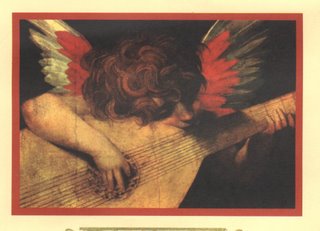
"M. Sor produces a very pretty things on the guitar, but I can state that I have always regretted that this artist, whose musical organisation is far from being commonplace, does not employ his abilities on an instrument that offers scope for his powers. Listening to M Sor, one recongnises a superior artist, but I repeat : Why does he play the guitar ?"
Anonymous quotation, originally from an newspaper in Paris 1832, I think my written note is from the Guitar (magazine).
Found this note recently in my boxes of notes, I don´t know about the spelling really (in my note)
It´s about Fernando Sor (1778-1839), one of the great pioneers of classical guitar (it was not much "classical" then, it was promptly "high-tech" of it´s time, and his music was relatively modern).
With all respect of M. Sor´s legacy, I´m more to the Italians of those times. The road against thick harmony, perfomed alone on solo guitar, was not very fruitable some time later.
All the guitarists in the mid 1800 got development problems in (if)competing with the pianists.
Mostly I find the Italians ( f x Giuliani, Carulli, Carcassi), more inspired by the violin, more cantabile...
But, another point of view on Fernando Sor´s extended sologuitarcomposition is; it´s not easy to play........, for example; his Fantasia No 1 (Opus 7) and the directly aftercoming Theme with variations, I feel it difficult to connect all the way. The risk to play separate gymnastic exercises is clear...., maybe more as we think of it today. In those times it was common to compose "with variations", maybe it was alright to do it in the real showcase manners. This was more and more the time of the virtuosos, for example the violinlegend Paganini (also Italian..., and he was also fond of guitar).
Editor Brian Jeffery (Oxford Guitar Music, 1974); "To convey the impression which it made upon his contemporaries, one can do no better than quote from a letter written to the English magazine The Giulianiad in London in 1833. The writer had heard Sor play at the Philharmonic Society´s concert at the Argyll Rooms in Regent Street in 1817:
"I trust it will not considered a prejudice on my part when I say, that the beautiful compositions of Sor have touched and inspired my soul beyond all others ... Let me point out to you, as a specimen, his delightful fantasia, opera 7 ; the introductory largo, in C minor, with its heart-thrilling combinations of chords (although rather spun out too long), which abounds with elegance and beauty from beginning to end, leading to the tender floating theme in C major, and it´s variations...Allow me, especially, to draw your attention to the variations, Nos. 1, 4, and 7, and say, whether music like that is not worth of study? The work first appeared in Paris 1814, being listed in the Bibliographie de l´Empire Francais on September 3rd of that year".
Anyway, I got up the idea of guitar exercising on new levels in the in the 1970-ies, I can say, everything about it came from the classical music tradition. I found out that the plans and ideas of exercising was even more developed in the classical piano- and violintradition. You could exercise for hours. Then for me came up the idea how meditative it was.
It had immediately nothing to do with the commercial fields, the stressful media market and so on. It was for my own sake. It was, one of many ways, to train my brain and body.
When not sitting with the guitar, I also, inspired by some yoga-instructions, found "new" ways of relaxing, listening, to mainly classical music. It was just wonderful. After the late seventies I´ve really not found it, in the same way, again in longer periods, but I remember...., it´s for my health,.....that´s one answer.
(and for the betzerwisser; yeah , ...I know it´s not the guitar on the picture, as a mother of fact it is; the lute, one of many kinds. Angelo Musicante - Rosso Fiorentino - Firenze - Galleria degli Uffizi)


